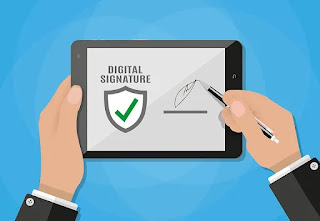Digital Signature
(Digital Signature)
A digital signature is a mathematical technique used to verify the authenticity of a digital message or document. It ensures that the document or message has not been tampered with and comes from the claimed sender.
Here are some key notes on digital signatures:
A digital signature is created using a combination of a private key and a hash function. The private key is known only to the signer, and the hash function creates a fixed-length message digest from the original message.
The digital signature includes both the original message and the message digest, encrypted using the signer's private key. The recipient can then use the signer's public key to decrypt the digital signature and verify the authenticity of the message.
Digital signatures are used to provide non-repudiation, which means that the signer cannot deny having signed the message. This is because the signature is unique to the signer and the message.
Digital signatures are used in various applications, such as electronic contracts, online banking, and email communication.
Digital signatures are not the same as digital certificates, which are used to verify the identity of the signer. Digital certificates are issued by trusted third-party organizations, while digital signatures are created by the signers themselves.
To ensure the security of digital signatures, it is important to keep the private key secret and protected from unauthorized access. Additionally, digital signatures may expire after a certain period, requiring the signer to renew them.





No comments:
Post a Comment